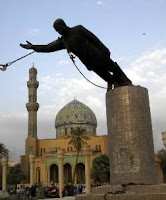The sociopolitical fabric of a nation, as charted through a Pew study...
The following is a summary of the findings of a Pew Research Center report on American public opinion and political trends, with my own insight of course. I skimmed the full 112-page report (the last 30 or so pages are just raw numbers), which you can find in PDF form.
American public is changing for the better. However, the changing demographic and much of the population, is politically apathetic. The still-widespread apathy explains why more polarized thinkers take action; there are more conservatives than there are liberals when one gets to either side. The middle is the section that is shifting towards a less traditional, more secular, more rational mindset. The middle is also unsure of itself and is losing confidence over what power they can exercise over their own government. The solution is simple: actually do something. Instead of complaining about your unrepresentative government, elect a different one or push your current one. At the moment, the special interests or polarized politicos dominate Washington. It doesn’t need to stay that way.
This latest Pew study is very informative and lays down some notions that most Americans — including the younger generations — are becoming more conservative, more intuitional, more religious, in a nutshell everything people like Rush Limbaugh, Sam Brownback, Dick Cheney, and James Dobson want them to be.
Americans still have a long way to go. They need to regain confidence in the power of the people instead of just lamenting their poor government, which, inevitably, always happens in a developed democracy.
Overall, this report projects good news and bad news about the course America and its people are taking and their views on such a course — for me at least. I've heard some say this poll is good news for Democrats; some say its good news for moderate Republicans.
The study also points out that Republicans are largely more conservative than Democrats are liberal; and that there are more conservatives interested in politics than liberals. Still, roughly half (Democrats and Republicans averaged) of those polled think `immigrants threaten American customs`, only emphasizing a need for proper education, especially in politics and history. People must have forgotten that their grandparents or their parents or their parents were immigrants. For example, a large number of Americans are of Irish or German heritage, and have ancestors who immigrated to the US only relatively recently (late 1800s, early 1900s). More on the immigration issue here, and more coming soon.
The government should help people in need and take responsibility of the needy, a good majority say. A lesser majority hold the above view, even to the point where debt is incurred from the government programs to help the needy (e.g. welfare, public health). In addition, many think a public health system is in order.
In foreign policy topics, Americans now finally view "getting even", i.e. employing 'an eye for an eye' strategy just isn’t a good idea. This complements the downward trend in the number of Americans who think peace is best achieved through military force — another slightly counter-intuitive notion.
There is also a decent dip in the overall percentage of people who think the US should remain active in world affairs, though the number is still in the 80s. The number who completely agree that America should keep active internationally has dropped from 50 percent in 2003 to 42 percent now. Bad news does come with that statistic: more and more Americans are developing isolationist sentiments.
The falloff in strong support for an active U.S. role
in global affairs is consistent with other Pew surveys over the past two years showing a decline in support for internationalism among the public. In “America’s Place in the World,” conducted in the fall of 2005, 42% said they believed the U.S. should “mind its own business” internationally – the highest percentage expressing that sentiment since the mid-1990s, after the Cold War, and the mid-1970s, following the Vietnam War.
That survey found that the growth in isolationist sentiment was largely concentrated
among Democrats. However, the values survey shows that both Democrats and Republicans are less likely to completely agree that the U.S. should take an active role on the world stage than they did four years ago. Similarly, the percentage of conservatives – regardless of party – who strongly favor an active U.S. stance in world affairs has fallen from 53% to 39% since 2003; this is comparable to the decline in strong support among self-described liberals (11 points).
I myself am an internationalist. However, that does not mean I think the United States and other powers should be able to meddle in other countries affairs, especially if the results are negative and there is no sufficient reason for the interference. Between the expansion of global free trade — like it or not — and the international exchange of ideas being fuelled by the Internet and the rise of developing countries, and the need for international awareness to take action in and prevent things like genocides and civil wars with mass implications (even to a country’s interests), isolationism is less of an option now than it was in the American know-nothing era between the two world wars. For economic, humanitarian, political, and security reasons, a global mindset is needed and, because of the aforementioned, the United States needs to stay active in international affairs. People need to realize the activity is not the problem, it is what that activity is that is the real problem: failed policies and bad politic. America doesn’t need to be less involved in world affairs to prevent another Iraq, it just needs to change its policy and policy-makers.
Americans are less confident, still patriotic but a bit less so, and still believe they should fight for their country, even if they don’t agree with what they are fighting for. Only a third overall believe torture is never justified, and the younger think it is more justified than the older. A majority still think preemptive force is justifiable. Americans are tough and fairly closed-minded on immigration, one of the few views kept constant since the Pew study of 1992. There has been a small boost in the number of people who view immigrants as a serious threat to traditional, all-American customs. Xenophobia is still popular, and, along with isolationism, are major sociopolitical threats to American progress in many ways.
Around one in ten is agnostic, atheist, or non-religious.
The survey also finds steady – if slow – declining support for traditional or conservative social values, in such areas as homosexuality and the role of women in society. This movement has been apparent on most of the six different measures of attitudes on social values, but is more evident when looking at the questions collectively (these values measures do not include opinions about abortion).
In 1987, about half of the survey’s respondents (49%) gave conservative answers to at least four of the six questions. In 2007, just 30% did so.
Keep in mind this is just a poll: one public study. It is a study put together by a reputable source, yes, but its results, like the results of many similar reports of public opinion and politics, should be taken with a grain of salt.
This report states the number of social conservatives is declining from the levels of the late 1980s and early 1990s. However, there have been studies that suggest otherwise, including those looking at an increasing number of evangelicals and members of the
religious right. No doubt the religious lobby is as powerful now as ever and the evangelical vote is more likely to be captured than the moderate vote because of the rampant apathy and feelings of a lack of options in the mind of the general public.
A majority of people still oppose gay marriage in any form. The death penalty also still has public support by a good majority. For the first time ever recorded in one of these Pew studies, a majority of people (51 percent) completely agree with the idea of interracial relationships. The number who agree (but not "completely") is at 83 percent, compared to a meager 48 percent in the 1987/1988 report. The government does not benefit people, its programs are usually inefficient and don’t have good outcomes, elected officials do not care about me or what I think — these are three statements most people, according to the study, agree with.
Most think governmental regulation of business is bad; the statistic is up dramatically for Democrats and down a bit for Republicans, possibly because of scandals similar to Enron. Companies have too much say in government, make too large of profits, and do not usually act in the public interest, say a majority of people polled. There are corporate skeptics of `evil` companies like Halliburton and ExxonMobil. On the whole, more young people view the success of business as a direct correlation to the success of America as a country. We are seeing less ethical, more commercialized young people (i.e. Gen Y), who are, at the same time, less religious and socially conservative. On socioeconomic issues, like government helping the needy and prevention of warrantless activity, blacks are more progressive than whites.
People view the political intelligence of the people as down. Also, most believe in the obligation to vote and interest in local politics is at a high. Far more people are afraid of personal information collected by business than government. Nearly 40 percent think warrantless searches should be allowed of "people like me" who may have terrorist leanings. 40 percent believe some civil liberties must be put aside in order to fight terrorism.
A very large majority of people believe in "stricter laws and regulation" to protect the environment.



 technorati tags:
technorati tags: 





